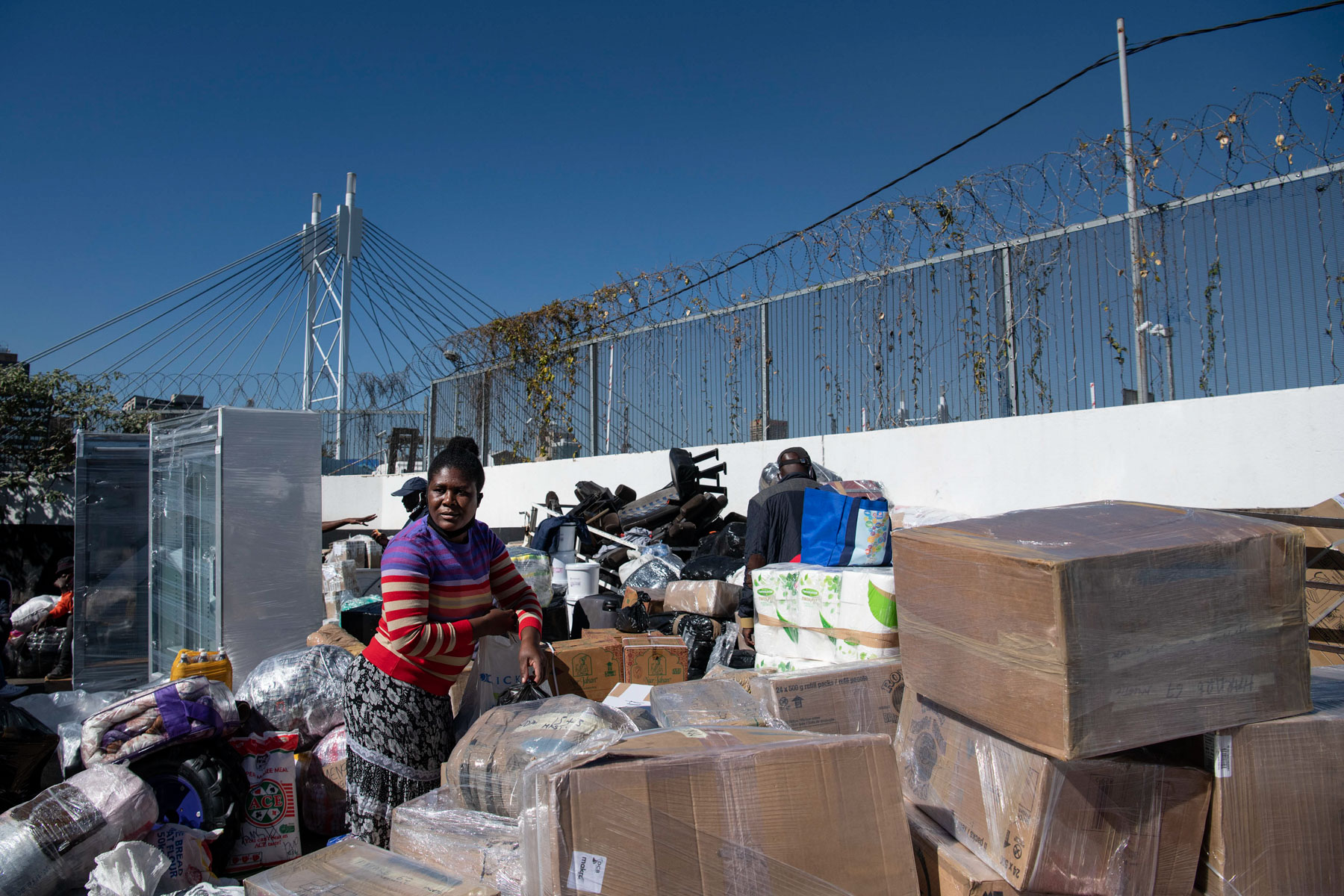Zimbabweans struggle as remittance lifeline shrinks
The Covid-19 lockdown has compounded the hardships faced by many Zimbabweans in their own country as well as those in South Africa who keep trying to help their families from afar.
Author:
2 June 2020

Before the Covid-19 pandemic and the resultant lockdown in South Africa, Blessing Masuku used to wait tables in Johannesburg. Now he waits for the ping from his computer that signals the arrival of emails. The messages he receives contain shopping lists sent from people in Bulawayo as well as the villages and small towns that are scattered around Zimbabwe’s second largest city.
Once Masuku receives notification that the money has been transferred to his account, he goes shopping. When his car is filled with groceries, he heads to a filling station in Smit Street, Braamfontein, close to the CBD of Johannesburg, from where trucks leave for Zimbabwe every day.
The filling station straddles both sides of the street. On one side are the trucks that leave for the Zimbabwean capital of Harare, while the vehicles headed for Bulawayo wait across the street. “When I realised that the UIF [Unemployment Insurance Fund] doesn’t pay foreign nationals, I had to make a plan. This pays a little bit,” said Masuku, adding that he gets two to three orders a week.
Related article:
Before the lockdown came into effect at midnight on 26 March, and with it the closure of South Africa’s borders, the forecourts of the two filling stations used to be filled with minibus taxis. They formed part of a trade network known as the “malaicha” system, the Ndebele word for “courier” or “transporting goods to and from”.
This informal transnational trade network has evolved over the past two decades or so as Zimbabwe faced sanctions and its economy spluttered. It comprises taxi drivers, middle men and sometimes smugglers, all of whom play a role in the survival of large sectors of the Zimbabwean population.
The taxis are no longer allowed to cross the border, so trucks have been hired instead. The problem is that trucks are far more expensive. “It now costs two to three times more than before to send goods up,” said Howard Thwala, a coordinator for the Zimbabwe International Long Distance Taxi Association. The trucks have another disadvantage too: they can take a week to reach their destination.
No work, no remittance
The coronavirus pandemic has been yet another severe blow to millions of Zimbabweans experiencing extreme hardship in their motherland, many of whom have been relying on remittances from the diaspora to survive. In December 2019, the United Nations warned that 7.7 million Zimbabweans were facing food insecurity. The severe drought in southern Africa has caused a maize meal shortage, and the agricultural sector is still struggling to deal with the devastation wrought by Cyclone Idai in March last year.
Related article:
“You can’t imagine the suffering. Now you have a situation where people can’t remit enough. Even those households that could sustain themselves through remittances have slid back into food insecurity,” said Vusi Thebe, an anthropologist at the University of Pretoria.
The lockdown in South Africa has left many Zimbabweans inside the country in dire straits too. “The majority of Zimbabweans are in the hospitality sector and are not working,” said Ngqabutho Mabhena, chairperson of the Zimbabwe Community in South Africa. “UIF is not being paid to migrant workers, so it is making it difficult to send money and goods home. Those who do send will be sending little compared with what they normally send.”
Zimbabweans are not suffering alone in this regard. Low and middle-income countries have seen sharp falls in remittances since the start of the Covid-19 pandemic and the concern is that this will have dire socioeconomic impacts.
It is estimated that remittances could fall by as much as 20% or $110 billion (about R1.9 trillion) in 2020.

“While we are anticipating a strong economic downturn globally, our concern is that there will be an even stronger knock-on effect for remittance-dependent economies, communities and families in terms of worsening access to education, health and nutrition, and broader poverty outcomes,” said António Vitorino, director general of the International Organization for Migration (IOM).
“We call upon policymakers, the private sector and civil society to focus on specific measures we can take in this regard to support migrants and their families.”
The IOM said governments and central banks should declare remittance transfer services an essential service. It also called on remittance service providers to reduce transaction costs.
Finding other ways
Apart from using trucks, Zimbabweans are finding other ways to get desperately needed food and other grocery items to their families. Theo Sibanda, whose family lives in Bulawayo, regularly used cross-border taxis – a system he says “always had its problems”. For one, it was expensive and required paying for many taxis: first to buy the groceries, then to deliver them to Braamfontein and finally to get them across the border.
Recently, when Sibanda’s sister urgently needed groceries, he discovered that the malaicha network had joined the tech revolution with an app called Malaicha.com. “You download the app and buy groceries and you pay for it at a bank, or a Shoprite or Spar or wherever. Then people collect them in Bulawayo,” said Sibanda, who discovered that it is far cheaper than using the old system.
Related article:
But although such apps can be convenient, they don’t suit everyone. Thebe has studied apps such as Malaicha.com and says there are many disadvantages compared with cross-border taxis. One of them is that users need to register and provide an ID number or passport number, which prevents undocumented migrants from using the apps. Another is their limited delivery range.
“They deliver to centre depots, unlike the minibus taxis that go into the rural areas and deliver in villages. Getting transport to these depots is expensive and it is hard to move around,” he explained. “This is more a channel for the elite – the urbanites.”
Shortage of medicines
In Rabie Ridge in Midrand, Ray Mutemeri is spending his lockdown days alone at home tying fly-fishing flies. He hopes that when the lockdown ends, fishermen will return to the shop where he works to stock up on their favourite flies.
Mutemeri has noticed that expats like him have to send more money home so that their families can buy much needed medicines, which are unavailable because the health system has all but collapsed in Zimbabwe. “I send money so my wife can buy from the pharmacies, but what about someone who is not working? How are people going to survive with this disease coming?” he said.
Related article:
Another concern for Mutemeri is that it is difficult for Zimbabweans to travel to town, as the lockdown has limited the use of public transport in Zimbabwe, and the police have clamped down on those travelling without permits.
Varied cargoes
In Smit Street, meanwhile, the packing of trucks continues through mid-morning on most days. There are long lines of so-called shangani bags, the Zimbabwean nickname for the large two-tone bags weaved from plastic that are the preferred carrier of choice for migrants across southern Africa.
Then there is the pile of heavily duct-taped buckets marked “hydraulic oil”. They do not contain oil, but make ideal containers to transport basic foodstuff. On each bucket is written an address and a telephone number. Thwala explains that when a truck gets to Bulawayo, its cargo will be transferred to smaller vehicles that will then make the journey to smaller towns and villages.

Only non-perishable goods are packed. The rumour is that if you want to send perishable goods such as meat, you need to talk to someone who can get through the border quickly. One such person is an undertaker travelling with a body back to Zimbabwe. An undertaker flies through the border, it is said. And no one wants to search a vehicle with a corpse in the back.
It is not just food that is packed, though. On the day of New Frame’s visit, there are slabs of marble possibly destined for a kitchen countertop somewhere in Zimbabwe. And there are parts of a car chassis wrapped in plastic, ready for the trip to Harare. “I just wish the South African government would allow the minibuses through the border,” sighed Masuku. “We just don’t know when they will be allowed to operate again.”
South Africa may be slowly moving out of its lockdown, with some restrictions eased, but the borders are likely to remain closed for some time yet. For now the hope is that the trucks will have a speedy journey through the border post and their cargo will get to the people who most need it.
“The virus is just the final nail in the coffin,” said Masuku. “Everything now is survival. There are so many people depending on us.”




